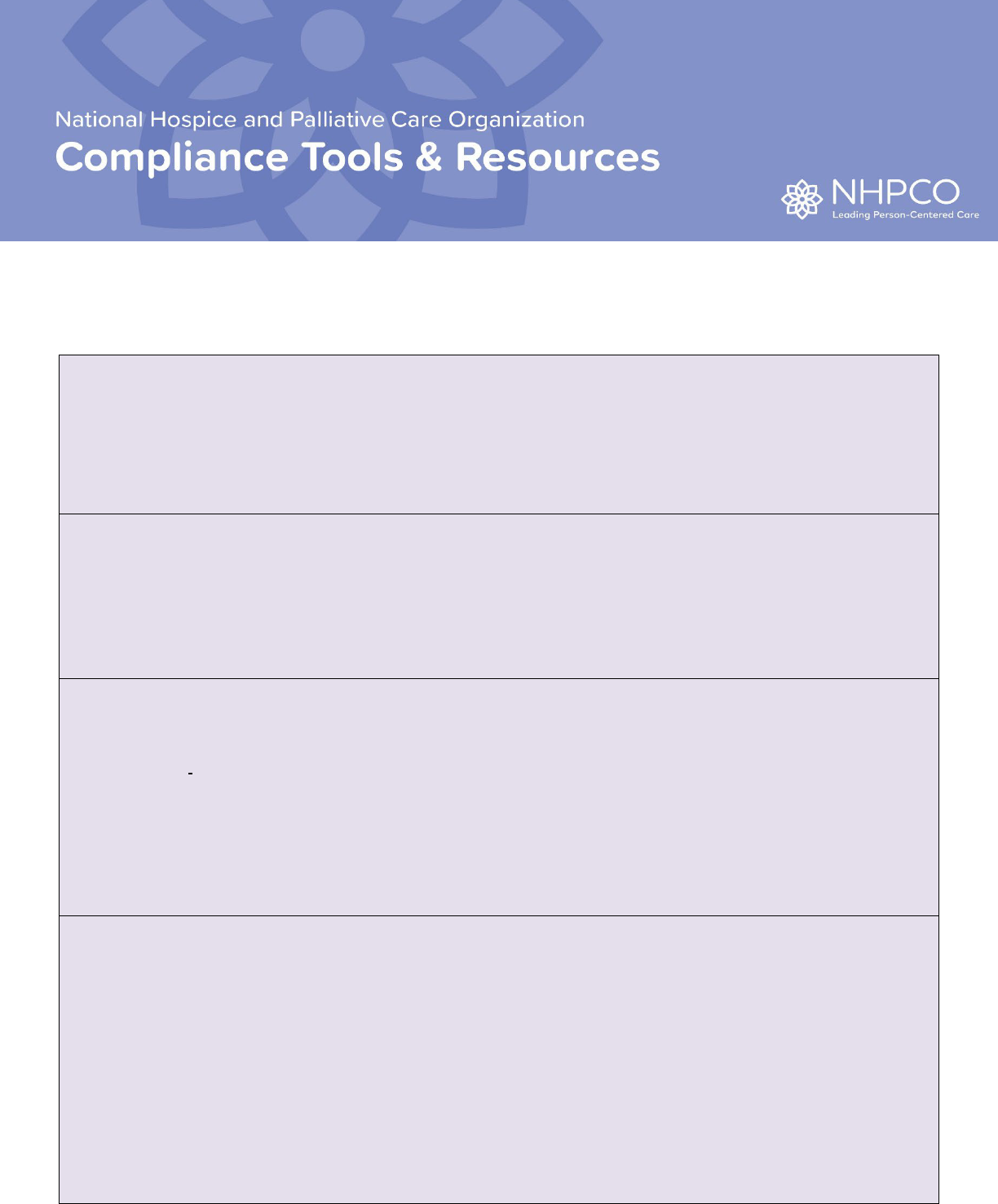
Medicare Hospice Conditions of Participation
Social Work
Revised May 2022
Summary
Highlights and guidance for implementation
1) 418.54 Initial and Comprehensive Assessment and Standard
2) 418.58 Quality Assessment/Performance Improvement
3) 418.114b Personnel Qualifications
§ 418.54 Initial and Comprehensive Assessment
Admission and Assessment: The social work assessment is a part of the comprehensive assessment, which
must be completed within five days of the election of hospice care. Many programs are sending an RN and a
social worker to jointly conduct the admission visit If this model is used, the social worker may begin their part
of the comprehensive assessment during this visit. Suggestions for implementation include using this visit as
an opportunity to evaluate the current psychosocial needs and status of the patient and family and collect
data to contribute to the patient’s plan of care.
§ 418.58 Quality Assessment/Performance Improvement
Outcome Measures: The CoPs require hospices conduct performance improvement projects as a part of the
Quality Assessment/Performance Improvement process.
Issues involving all disciplines, including social work will be considered. Social workers and other members of
the interdisciplinary group (IDG) may be less familiar with collecting data on measurable outcome measures
and may need additional education and collaboration on how to proceed. For social work specific issues,
programs located in communities with institutions of higher learning may want to seek training from social
work faculty on data collection and outcome measures. Overall Quality Assessment/Performance
Improvement process should lead to better patient care through research that helps guide appropriate
social work interventions as needed.
§ 418.114b Personnel Qualifications
The CoPs require the social worker either:
• Has a Master of Social Work (MSW) degree from a school of social work accredited by the Council on
Social Work Education or
• Has a baccalaureate degree in Social Work (BSW) from an institution accredited by the Council on
Social Work Education; or
• A baccalaureate degree in psychology, sociology, or other fields related to social work, and is
supervised by an MSW as described in paragraph (b)(3)(i)(A) of this section; and
o Has 1 year of social work experience in a healthcare setting; or
o Has a baccalaureate degree from a school of social work accredited by the Council of Social
Work Education, is employed by the hospice before December 2, 2008, and is not required to
be supervised by an MSW.

National Hospice and Palliative Care Organization, Revised May 2022
Page 2
Social work supervision: The CoPs require BSW social workers hired after December 2, 2008, and those with
non-social work degrees will need to have MSW supervision.
Additional information
State Laws: In an effort to protect the public from individuals misrepresenting their qualifications, some
states have passed laws preventing individuals from using the title of social worker unless they have a social
work degree from a school of social work accredited by the Council of Social Work Education; a number of
states also require licensure or certification of social workers in their states. Hospice programs need to be
aware of state law when it is more stringent than the Federal CoPs. Given the variability of state laws,
hospices should consult the Association of Social Work Boards website (www.aswb.org) or their state’s
department of professional regulation to learn more about laws and regulations relating to the practice of
social work.
What resources will I need to be successful?
• The NHPCO Social Work Guidelines provides very useful information for hospice social workers and
should be a primary source
• The National Association of Social Workers (NASW)’s Standards for Palliative and End of Life Care can
be a helpful resource for standards of professional practice for new hospice social workers
• Information on clinical supervision is available in the NHPCO Social Work Guidelines and may be a helpful
resource in writing supervision policies (www.nhpco.org/marketplace, item number 712653)
• Hospice programs need to policies and procedures to guide agency hiring and orientation practices for
candidates for social work positions with a non-social work degree or a degree from a “related field”
• Hospice programs need to determine the level of supervision needed to assure high quality patient care,
including both clinical and administrative supervision; state regulations and the NHPCO Social Work
Guidelines will be helpful in guiding decision making
• Rural or small programs that have had difficulty identifying or recruiting an MSW to provide clinical
supervision may need to contract with an MSW for a specific number of hours per week to provide
supervision
• Programs may wish to work with their State hospice organization and their state’s Schools of Social
Work to build relationships to facilitate recruitment and hiring
• Use other materials developed for social work featured in the NHPCO Marketplace
• Join the My.NHPCO Social Work community
• Join at least one of the My.NHPCO list servs to get more information and stay current
Developed by the My.NHPCO Social Work Section – Revised June 2022
